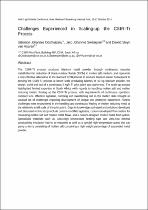JavaScript is disabled for your browser. Some features of this site may not work without it.
- ResearchSpace
- →
- Research Publications/Outputs
- →
- Conference Publications
- →
- View Item
| dc.contributor.author |
Oosthuizen, SJ

|
|
| dc.contributor.author |
Swanepoel, JJ

|
|
| dc.contributor.author |
Van Vuuren, DS

|
|
| dc.date.accessioned | 2015-08-19T10:48:49Z | |
| dc.date.available | 2015-08-19T10:48:49Z | |
| dc.date.issued | 2014-10 | |
| dc.identifier.citation | Oosthuizen, S.J, Swanepoel, J.J and Van Vuuren, D.S. 2014. Challenges experienced in scaling-up the CSIR-Ti process. In: AMI Light Metals Conference, Kwa Maritane Pilanesberg National Park, 15-17 October 2014 | en_US |
| dc.identifier.uri | http://www.scientific.net/AMR.1019.187 | |
| dc.identifier.uri | http://hdl.handle.net/10204/8055 | |
| dc.description | AMI Light Metals Conference, Kwa Maritane Pilanesberg National Park, 15-17 October 2014. Due to copyright restrictions, the attached PDF file only contains the abstract of the full text item. For access to the full text item, please consult the publisher's website | en_US |
| dc.description.abstract | The CSIR-Ti process produces titanium metal powder through continuous stepwise metallothermic reduction of titanium tetrachloride (TiCl(sub4)) in molten salt medium, and represents a cost-effective alternative to the standard Kroll process to produce titanium metal. Subsequent to proving the CSIR-Ti process at bench scale producing batches of ±2 kg titanium powder, the design, build and test of a continuous 2 kg/h Ti pilot plant was authorised. The scale-up process highlighted limited expertise in South Africa with regards to handling molten salt and molten reducing metals. Scaling up the CSIR-Ti process, with requirements of continuous operation, compact size, effective agitation, pumping and maintaining salt in the molten state brought an unusual set of challenges requiring development of unique and prototype equipment. Further challenges were encountered in the handling and continuous feeding of molten reducing metal at the relatively small scale of the pilot plant. Gaps in knowledge addressed and solutions developed and discussed in this study include custom-modified agitators, custom-developed flow meters for measuring molten salt and molten metal flows, and a custom-designed molten metal feed system. Specialised materials such as, ultra-high temperature heating tape and ultra-low thermal conductivity insulation had to be imported as well as a special high-temperature pump that can pump a slurry consisting of molten salt containing a high weight percentage of suspended metal powder. | en_US |
| dc.language.iso | en | en_US |
| dc.publisher | Trans Tech Publications Inc | en_US |
| dc.relation.ispartofseries | Workflow;14643 | |
| dc.subject | CSIR-Ti | en_US |
| dc.subject | Titanium metal powder | en_US |
| dc.subject | Metallothermic | en_US |
| dc.subject | Titanium tetrachloride | en_US |
| dc.subject | Molten salt | en_US |
| dc.subject | Molten reducing metals | en_US |
| dc.title | Challenges experienced in scaling-up the CSIR-Ti process | en_US |
| dc.type | Conference Presentation | en_US |
| dc.identifier.apacitation | Oosthuizen, S., Swanepoel, J., & Van Vuuren, D. (2014). Challenges experienced in scaling-up the CSIR-Ti process. Trans Tech Publications Inc. http://hdl.handle.net/10204/8055 | en_ZA |
| dc.identifier.chicagocitation | Oosthuizen, SJ, JJ Swanepoel, and DS Van Vuuren. "Challenges experienced in scaling-up the CSIR-Ti process." (2014): http://hdl.handle.net/10204/8055 | en_ZA |
| dc.identifier.vancouvercitation | Oosthuizen S, Swanepoel J, Van Vuuren D, Challenges experienced in scaling-up the CSIR-Ti process; Trans Tech Publications Inc; 2014. http://hdl.handle.net/10204/8055 . | en_ZA |
| dc.identifier.ris | TY - Conference Presentation AU - Oosthuizen, SJ AU - Swanepoel, JJ AU - Van Vuuren, DS AB - The CSIR-Ti process produces titanium metal powder through continuous stepwise metallothermic reduction of titanium tetrachloride (TiCl(sub4)) in molten salt medium, and represents a cost-effective alternative to the standard Kroll process to produce titanium metal. Subsequent to proving the CSIR-Ti process at bench scale producing batches of ±2 kg titanium powder, the design, build and test of a continuous 2 kg/h Ti pilot plant was authorised. The scale-up process highlighted limited expertise in South Africa with regards to handling molten salt and molten reducing metals. Scaling up the CSIR-Ti process, with requirements of continuous operation, compact size, effective agitation, pumping and maintaining salt in the molten state brought an unusual set of challenges requiring development of unique and prototype equipment. Further challenges were encountered in the handling and continuous feeding of molten reducing metal at the relatively small scale of the pilot plant. Gaps in knowledge addressed and solutions developed and discussed in this study include custom-modified agitators, custom-developed flow meters for measuring molten salt and molten metal flows, and a custom-designed molten metal feed system. Specialised materials such as, ultra-high temperature heating tape and ultra-low thermal conductivity insulation had to be imported as well as a special high-temperature pump that can pump a slurry consisting of molten salt containing a high weight percentage of suspended metal powder. DA - 2014-10 DB - ResearchSpace DP - CSIR KW - CSIR-Ti KW - Titanium metal powder KW - Metallothermic KW - Titanium tetrachloride KW - Molten salt KW - Molten reducing metals LK - https://researchspace.csir.co.za PY - 2014 T1 - Challenges experienced in scaling-up the CSIR-Ti process TI - Challenges experienced in scaling-up the CSIR-Ti process UR - http://hdl.handle.net/10204/8055 ER - | en_ZA |






